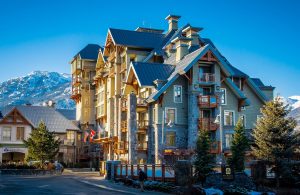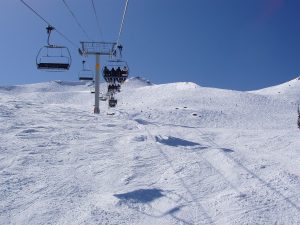Whistler just opened for skiing over the past weekend. They currently are operating with ultra pre-season conditions: the current base depth of the snow pack is 59cm. For context, skiing is usually not even a great idea until there is at least 100cm of snow covering the ground. Until that point there’s a lot of hazards to avoid, like trees and rocks that pop out at you out of nowhere. In order for the skiing to actually be good, there needs to be at least 150cm to work with.
They were miles away from the generally accepted base level snow pack, and yet, this weekend the lift lines were still over an hour long.
How is that possible?
The answer is that Whistler is incredibly clever with their marketing.
Whistler has assumed a top position in most Vancouverites’ opinions of the best local ski resort. This is interesting because most avid skiers would know there’s nothing overly special about Whistler in terms of the skiing. Especially considering that Mount Baker is the same distance from the center of the city, it’s quite interesting that Whistler is regarded as the better option. The snow at Whistler is always a little mushy until you get up to the peak, and the peak is great if it’s a clear day; the issue with the peak is that there’s basically no trees up there, so if there’s a little bit of fog and the visibility is low, you’re not going to be able to see anything. It turns into a white out blur. Unless the conditions are picture perfect, skiing at Whistler isn’t really anything to write home about. On top of that, a lift ticket for a day pass at Whistler will set you back $299. Let that sink in.
Somehow, Whistler has managed to convince most of the population that they offer the best skiing, and that their obscene prices are justified. They have managed to market themselves as a resort which offers the highest prestige and quality. Does this sound familiar at all? It’s not unlike the way that luxury brands operate. They too have benefitted immensely from the perception of exclusivity and high-quality craftsmanship, despite there being an ongoing debate of the whole concept being a matter of smoke and mirrors. In fact, many people have started viewing luxury labels, with their excessive use of branding and grandiose displays of opulence, as tacky. Quite the opposite effect of what is intended.
Through the same use of strategic advertising and psychological trickery, Whistler has become the luxury brand of ski resorts. They have spread the idea that their resort offers the best of everything. They say, they have 8,000 acres of skiable terrain [a lot of which is unremarkable], more than 200 marked runs [as do many other ski resorts], and a village at the heart of the resort [basically just gives it city vibes]. For people like myself, who ski at resorts outside of the city, we have a bit wider perspective on what kind of things the rest of the world has to offer. We know that underneath all of the aesthetics that Whistler promotes, it is largely indistinguishable from all of the others. As a result, we often view Whistler skiers as short-sighted victims to brand manipulation. It’s not supposed to be taken as condescending, as more often than not our opinions are based in objective truths. When you go to the lesser known resorts you get down-to-earth rustic energy, a community of friendly people, and less traffic (meaning less time in lift lines and more time on the hill). It also is usually just a more authentic experience all around.
This situation gives an interesting demonstration of the concept of ego morphing. People use brands to promote a particular image that they have, or want to have, of themselves. Ego morphing is at the root cause of many of your unnecessary purchases; if a seller appeals to your ego, or convinces you that their product will make you feel better about yourself, you’re far more likely to buy into it. People will buy into practically anything if they can be convinced that it will make them better. We will rationalize just about any purchase if we believe that the product will solve our perceived inadequacies. It explains why there is such an abundance of luxury items that boast overt labelling and ostentatious displays of logo placement. If the consumer is buying into the luxury market so that other people will perceive them as being wealthy and high status, they will want a product that lets people know it’s worth big money. Some people are buying the most ridiculous looking items you’ve ever seen, simply because being associated with a costly label makes them feel good about themselves.
By creating an image of prestige and glamour, Whistler has curated the same energy as a designer brand. Some people believe that if you are a Whistler skier, you are in a league above the others. They use this curated principle to rationalize the unjust markup on every amenity that the place has to offer, which through the process of ego morphing, people are willing to absorb. Because at the end of the day, who cares if you’re getting ripped off left right and centre? You get to go home and tell everyone you know that you went on a ski trip at Whistler!
That seems a bit ridiculous, doesn’t it? Does it make a bit more sense why out-of-city skiers feel the way we do?
I don’t mean to rip on Whistler too hard. After all, I do think that it’s fantastic whenever you can get people outside and enjoying the magic of what nature has to offer. All I’m saying is that the commercialization of the place rubs me the wrong way. It seems superficial. But hey, maybe you’re into that kind of thing. I don’t know.
I’m just trying to make people aware of what’s going on under the surface here because this isn’t specific to Whistler. Once you understand this concept, it’s worthwhile to evaluate whether your inclinations and impulses are coming from a place of genuine desire or from a place of perceived lacking. If you’re making purchases based on your own perceived inadequacies, that means companies are benefitting from your insecurities and/or emotional void. That’s just not a very nice thing to think about at all.
Love you. <3



